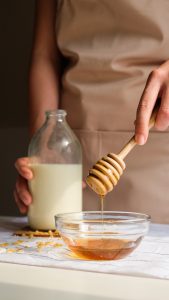 The American diet is laden with sugar. In fact, the average American eats approximately 152 pounds of sugar every year. When you compare that with the amount of sugar Americans ate just 200 years ago, which was approximately two pounds a year, the change is significant. It’s one reason diabetes is on the rise and why so many people look for alternatives. Most people think of those little pink, blue or yellow packets when they hear the words, sugar replacements, which are saccharin, aspartame and sucralose. Each of these come with the potential for negative side effects when used too frequently.
The American diet is laden with sugar. In fact, the average American eats approximately 152 pounds of sugar every year. When you compare that with the amount of sugar Americans ate just 200 years ago, which was approximately two pounds a year, the change is significant. It’s one reason diabetes is on the rise and why so many people look for alternatives. Most people think of those little pink, blue or yellow packets when they hear the words, sugar replacements, which are saccharin, aspartame and sucralose. Each of these come with the potential for negative side effects when used too frequently.
Natural sugar substitutes include Stevia.
Stevia comes from the Stevia rebaudiana bush from South America. It’s the leaves of the plant that are used and have a sweetness that’s 200 times that of table sugar, but with no calories. It does come with several health benefits, such as the ability to aid in lowering blood pressure and reducing the risk of metabolic syndrome. However, the body also recognizes it doesn’t provide energy and animal studies show that when fed stevia, they consumed more calories and gained more weight from other food than those fed food flavored with glucose, which may counteract their benefit for those who want to lose weight.
A new option to the market that’s been used hundreds of years is monk fruit.
Monk fruit is between 150 and 300 times sweeter than sugar and it doesn’t have any calories or affect blood glucose levels. Other names for monk fruit include Luo Han Guo, Buddha fruit and longevity fruit. Those names came from the fact that Buddhist monks picked the fruit and used it for medicine.Like stevia, it has an aftertaste and even a when eating it, a taste that isn’t pleasing to everyone. It’s high in vitamin C, so can boost the immune system, is good for reducing the respiratory distress of allergies and can improve heart health, while reducing inflammation. People with pumpkin allergies or problems with their pancreas shouldn’t use it.
Opt for fresh fruit and fruit paste instead of sugar.
There are many ways to use fresh fruit and fruit paste in cooking to substitute for sugar. Date paste, for instance, is exceptionally good in sweetening baked goods and has a low glycemic index—GI rating. You can use unsweetened applesauce as a substitute for some of the sugar and oils in baked goods too. If you want a fruit and yogurt mix, don’t buy the ready made type; it has added sugar. Instead, get plain yogurt and add frozen fruit. Put it in a blender for a substitute for ice cream.
- Honey has slightly fewer calories than sugar, but does provide many health benefits and nutrients. It has antioxidants, calcium, potassium, vitamin B6, riboflavin and niacin to name a few, but with a low GI rating.
- The root of the yacon plant looks like a sweet potato and when eaten raw tastes like a combination of watermelon, apple and celery. When boiled down, it creates a sugar substitute that lowers blood sugar levels.
- While coconut sugar does have calories, it contains far less than sugar. It also has nutrients like polyphenols, iron, antioxidants and potassium. It’s good to use when baking.
- Some of the original substitutes for sugar, like xylitol and other sugar alcohols also have fewer calories and some health benefits, such as reducing the risk of tooth decay and antioxidants. However, they also can cause diarrhea and gas.
For more information, contact us today at Prime Fitness Studio
